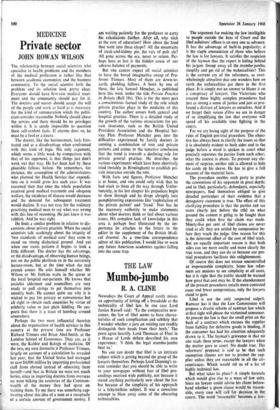Private sector
MEDICINE JOHN ROWAN WILSON
The relationship between social scientists who specialise in health problems and the members of the medical profession is rather like that between academic economists and the business community. To the social scientist both the problem and its solution look pretty clear. Everyone should have first-rate medical treat- ment and the community should pay for it. The doctors and nurses should accept the will of the people and work as hard as is necessary for, the kind of remuneration which the politi- cians consider reasonable. Nobody should abuse the service and there should be no privileges within it. It is surely impossible to question these self-evident facts. If anyone does so, he mast be a fool or a knave.
The doctor, like the businessman, feels frus- trated and at a disadvantage when confronted with this kind of logic. His only argument, which seems a little weak by comparison with that • of his opponent, is that things just don't work out that way. lie, has been had by these plausible fellows before. He remembers, for instance, the assumption of the administrators who planned the Health Service that expendi- ture on it would grow, less each year. It was reasoned then that once the whole population received good medical treatment and adequate welfare, the incidence of disease would decrease and the demand for subsequent treatment would decline. It was not easy for the ordinary practising medical man to say what was wrong with this line of reasoning. He just knew it was rubbish. And he was right He finds a similar problem in relation to dis- cussions about private practice. When the social scientists talk scathingly about the iniquity of 'two standards of medical care' they seem to stand on strong dialectical ground. And yet when one treats patients it begins to look a little different. The doctor has the advantage, or the disadvantage, of observing human beings, not on the public platform or in the university lecture-room, but at the time when the real crunch comes. He asks himself whether Mr Wilson or Mr Jenkins waits in the queue at the local hospital out-patients. He knows that socialist aldermen and councillors are very ready to pull strings to get themselves into amenity beds. He cannot quite see why it is wicked to pay for privacy or convenience but all right to obtain such amenities by virtue of celebrity value or just plain fiddling. He sus- pects that there is a trace of humbug around somewhere.
Perhaps the two most influential theorists about the organisation of health services in this country at the present time are Professor Richard Titmuss and Brian Abel-Smith, at the London School of Economics. They are, as it were, the Kaldor and Balogh of medicine. Of the two, my own favourite is Professor Titmuss, largely on account of a calculation he revealed last year, that the United States had managed to save $4,000 million by importing professional staff from abroad instead of educating them herself—and that in Britain we were not much better, since in importing doctors from overseas we were bilking the countries of the Common- wealth of the money they had spent on training them. To me there was something cap- tivating about this idea of a man as a receptacle of a certain amount of government money. I am waiting patiently for the professor to carry his calculations further. After- all, why stick at the cost of education? How about the food that went into these chaps? All the mountains of steak-and-kidney pie, the vats of pale ale? All gone across the sea, never to return. Per- haps here at last is the hidden cause of our adverse balance of payments.
But one cannot expect all social scientists to have the broad imaginative sweep of Pro- fessor Titmuss. Most of them are down-to- earth, plodding fellows. A book by one of these, the late Samuel Mencher, is published here this week under the title Private Practice in Britain (Bell 18s). This is for the most part a conscientious factual study of the role which private practice plays in the medicine of this country. The author covers both general and hospital practice. There is a detailed study of the growth of the various associations for pri- vate insurance, such as the British United Proyident Association and the Hospital- Ser- vice Plan. Professor Mencher goes into the difficulties experienced by family doctors in running a combination of NHS and private patients and comes to the tentative conclusion _ that the trend is towards a declining, ,role for private general practice. He describes the various experiments which have been abortively tried (notably in Birmingham) to establish pri- vate insurance outside the NHS.
With facts and figures, Professor Mencher is at home, and one could only wish that he had stuck to them all the way through. Unfor- tunately, in his last chapter his prejudices begin to show through and he drops abruptly into pamphleteering expressions like 'exploitation of the private patient' and 'fraud.' Nor has he the necessary authority to make statements about what doctors think or feel about various issues. His complete lack of knowledge in this area is perhaps best illustrated by the im- portance he attaches to the letters to the editor in the supplement of the British Medi- cal Journal. As a one-time correspondence editor of this publication, I would like to warn any future American academics against falling into the same trap.


































 Previous page
Previous page